A Comprehensive Essay on Globalization and Bulgarian Cultural Identity
VerifiedAdded on 2022/12/29
|7
|1638
|1
Essay
AI Summary
This essay delves into the multifaceted relationship between globalization and Bulgarian culture. It begins by defining globalization and its impact on various aspects of society, including economics, culture, and the flow of information. The essay then provides an overview of Bulgarian culture, highlighting its historical roots, traditions, and influences. The core of the essay examines how globalization has affected Bulgarian culture, including the exchange of cultural values, the potential loss of cultural identity due to assimilation, and the influence of international trends on the younger generation. It also discusses the economic context of Bulgaria prior to and after democratic reforms, including the impact of privatization. Furthermore, the essay analyzes the interaction between globalization and culture, the concept of cultural imperialism, and the application of Hofstede's model to understand Bulgarian cultural diversity. The conclusion summarizes the key findings, emphasizing the significant influence of globalization on Bulgarian culture and the importance of preserving cultural identity in a globalized world.
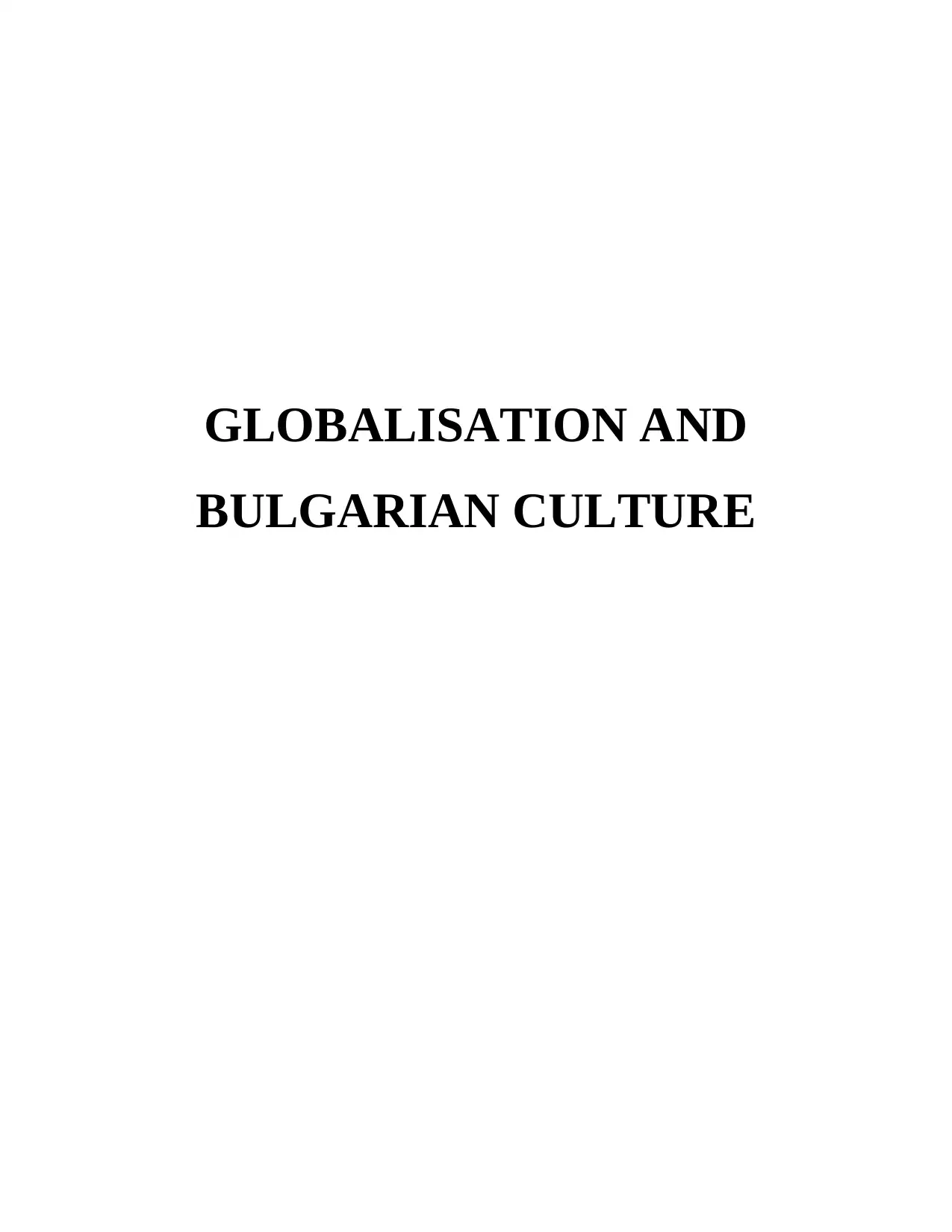
GLOBALISATION AND
BULGARIAN CULTURE
BULGARIAN CULTURE
Paraphrase This Document
Need a fresh take? Get an instant paraphrase of this document with our AI Paraphraser

TABLE OF CONTENTS
INTRODUCTION...........................................................................................................................1
ESSAY.............................................................................................................................................1
CONCLUSION................................................................................................................................4
REFERENCES................................................................................................................................5
INTRODUCTION...........................................................................................................................1
ESSAY.............................................................................................................................................1
CONCLUSION................................................................................................................................4
REFERENCES................................................................................................................................5
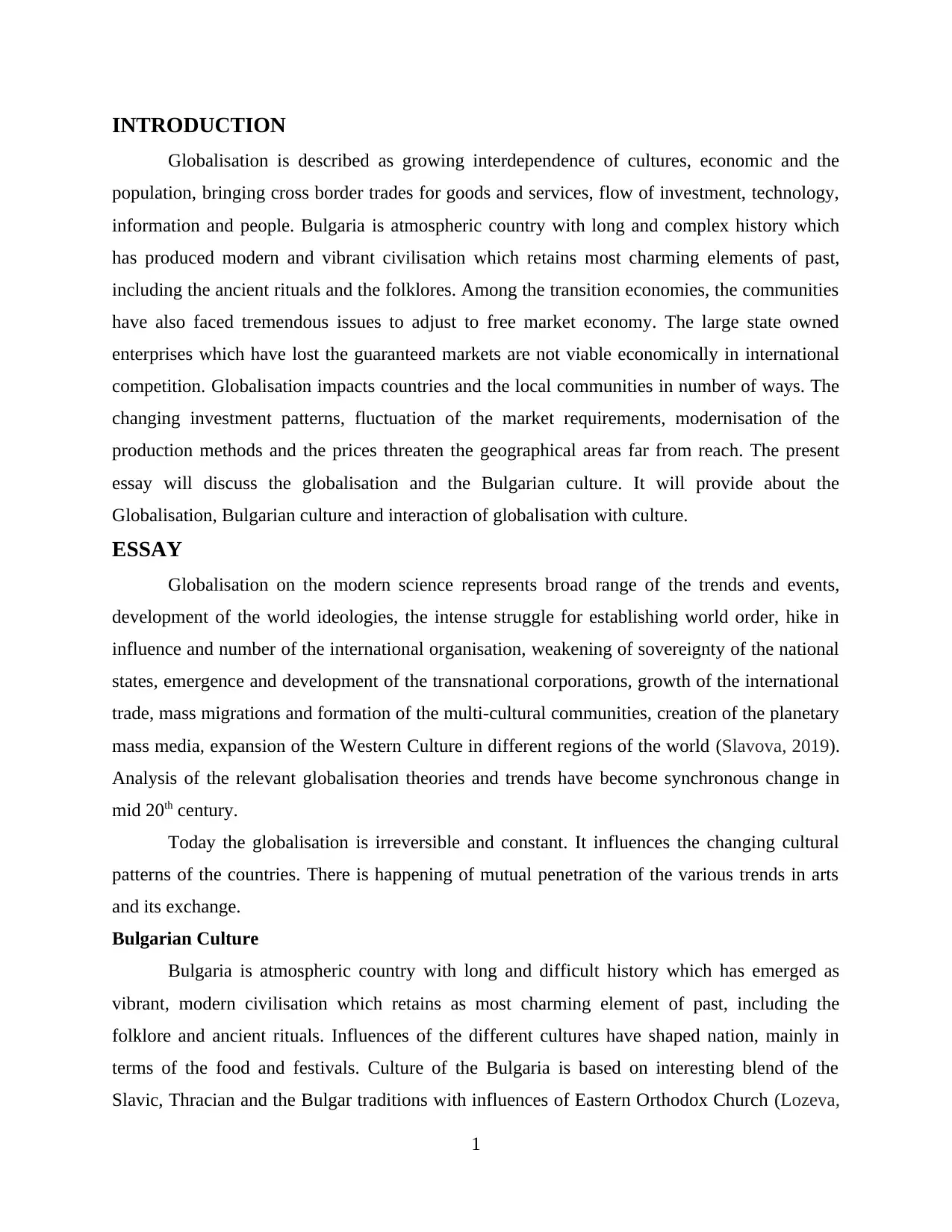
INTRODUCTION
Globalisation is described as growing interdependence of cultures, economic and the
population, bringing cross border trades for goods and services, flow of investment, technology,
information and people. Bulgaria is atmospheric country with long and complex history which
has produced modern and vibrant civilisation which retains most charming elements of past,
including the ancient rituals and the folklores. Among the transition economies, the communities
have also faced tremendous issues to adjust to free market economy. The large state owned
enterprises which have lost the guaranteed markets are not viable economically in international
competition. Globalisation impacts countries and the local communities in number of ways. The
changing investment patterns, fluctuation of the market requirements, modernisation of the
production methods and the prices threaten the geographical areas far from reach. The present
essay will discuss the globalisation and the Bulgarian culture. It will provide about the
Globalisation, Bulgarian culture and interaction of globalisation with culture.
ESSAY
Globalisation on the modern science represents broad range of the trends and events,
development of the world ideologies, the intense struggle for establishing world order, hike in
influence and number of the international organisation, weakening of sovereignty of the national
states, emergence and development of the transnational corporations, growth of the international
trade, mass migrations and formation of the multi-cultural communities, creation of the planetary
mass media, expansion of the Western Culture in different regions of the world (Slavova, 2019).
Analysis of the relevant globalisation theories and trends have become synchronous change in
mid 20th century.
Today the globalisation is irreversible and constant. It influences the changing cultural
patterns of the countries. There is happening of mutual penetration of the various trends in arts
and its exchange.
Bulgarian Culture
Bulgaria is atmospheric country with long and difficult history which has emerged as
vibrant, modern civilisation which retains as most charming element of past, including the
folklore and ancient rituals. Influences of the different cultures have shaped nation, mainly in
terms of the food and festivals. Culture of the Bulgaria is based on interesting blend of the
Slavic, Thracian and the Bulgar traditions with influences of Eastern Orthodox Church (Lozeva,
1
Globalisation is described as growing interdependence of cultures, economic and the
population, bringing cross border trades for goods and services, flow of investment, technology,
information and people. Bulgaria is atmospheric country with long and complex history which
has produced modern and vibrant civilisation which retains most charming elements of past,
including the ancient rituals and the folklores. Among the transition economies, the communities
have also faced tremendous issues to adjust to free market economy. The large state owned
enterprises which have lost the guaranteed markets are not viable economically in international
competition. Globalisation impacts countries and the local communities in number of ways. The
changing investment patterns, fluctuation of the market requirements, modernisation of the
production methods and the prices threaten the geographical areas far from reach. The present
essay will discuss the globalisation and the Bulgarian culture. It will provide about the
Globalisation, Bulgarian culture and interaction of globalisation with culture.
ESSAY
Globalisation on the modern science represents broad range of the trends and events,
development of the world ideologies, the intense struggle for establishing world order, hike in
influence and number of the international organisation, weakening of sovereignty of the national
states, emergence and development of the transnational corporations, growth of the international
trade, mass migrations and formation of the multi-cultural communities, creation of the planetary
mass media, expansion of the Western Culture in different regions of the world (Slavova, 2019).
Analysis of the relevant globalisation theories and trends have become synchronous change in
mid 20th century.
Today the globalisation is irreversible and constant. It influences the changing cultural
patterns of the countries. There is happening of mutual penetration of the various trends in arts
and its exchange.
Bulgarian Culture
Bulgaria is atmospheric country with long and difficult history which has emerged as
vibrant, modern civilisation which retains as most charming element of past, including the
folklore and ancient rituals. Influences of the different cultures have shaped nation, mainly in
terms of the food and festivals. Culture of the Bulgaria is based on interesting blend of the
Slavic, Thracian and the Bulgar traditions with influences of Eastern Orthodox Church (Lozeva,
1
⊘ This is a preview!⊘
Do you want full access?
Subscribe today to unlock all pages.

Trusted by 1+ million students worldwide
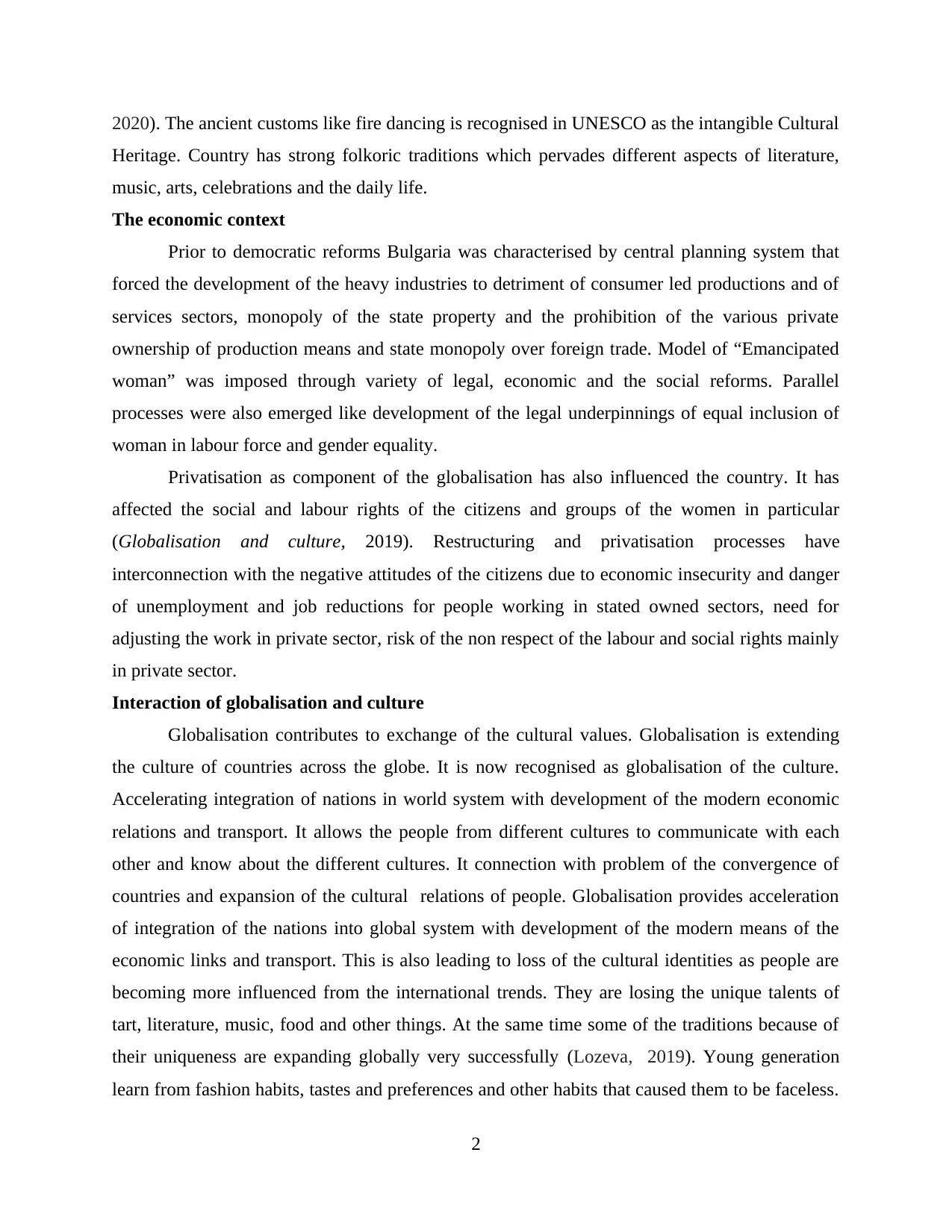
2020). The ancient customs like fire dancing is recognised in UNESCO as the intangible Cultural
Heritage. Country has strong folkoric traditions which pervades different aspects of literature,
music, arts, celebrations and the daily life.
The economic context
Prior to democratic reforms Bulgaria was characterised by central planning system that
forced the development of the heavy industries to detriment of consumer led productions and of
services sectors, monopoly of the state property and the prohibition of the various private
ownership of production means and state monopoly over foreign trade. Model of “Emancipated
woman” was imposed through variety of legal, economic and the social reforms. Parallel
processes were also emerged like development of the legal underpinnings of equal inclusion of
woman in labour force and gender equality.
Privatisation as component of the globalisation has also influenced the country. It has
affected the social and labour rights of the citizens and groups of the women in particular
(Globalisation and culture, 2019). Restructuring and privatisation processes have
interconnection with the negative attitudes of the citizens due to economic insecurity and danger
of unemployment and job reductions for people working in stated owned sectors, need for
adjusting the work in private sector, risk of the non respect of the labour and social rights mainly
in private sector.
Interaction of globalisation and culture
Globalisation contributes to exchange of the cultural values. Globalisation is extending
the culture of countries across the globe. It is now recognised as globalisation of the culture.
Accelerating integration of nations in world system with development of the modern economic
relations and transport. It allows the people from different cultures to communicate with each
other and know about the different cultures. It connection with problem of the convergence of
countries and expansion of the cultural relations of people. Globalisation provides acceleration
of integration of the nations into global system with development of the modern means of the
economic links and transport. This is also leading to loss of the cultural identities as people are
becoming more influenced from the international trends. They are losing the unique talents of
tart, literature, music, food and other things. At the same time some of the traditions because of
their uniqueness are expanding globally very successfully (Lozeva, 2019). Young generation
learn from fashion habits, tastes and preferences and other habits that caused them to be faceless.
2
Heritage. Country has strong folkoric traditions which pervades different aspects of literature,
music, arts, celebrations and the daily life.
The economic context
Prior to democratic reforms Bulgaria was characterised by central planning system that
forced the development of the heavy industries to detriment of consumer led productions and of
services sectors, monopoly of the state property and the prohibition of the various private
ownership of production means and state monopoly over foreign trade. Model of “Emancipated
woman” was imposed through variety of legal, economic and the social reforms. Parallel
processes were also emerged like development of the legal underpinnings of equal inclusion of
woman in labour force and gender equality.
Privatisation as component of the globalisation has also influenced the country. It has
affected the social and labour rights of the citizens and groups of the women in particular
(Globalisation and culture, 2019). Restructuring and privatisation processes have
interconnection with the negative attitudes of the citizens due to economic insecurity and danger
of unemployment and job reductions for people working in stated owned sectors, need for
adjusting the work in private sector, risk of the non respect of the labour and social rights mainly
in private sector.
Interaction of globalisation and culture
Globalisation contributes to exchange of the cultural values. Globalisation is extending
the culture of countries across the globe. It is now recognised as globalisation of the culture.
Accelerating integration of nations in world system with development of the modern economic
relations and transport. It allows the people from different cultures to communicate with each
other and know about the different cultures. It connection with problem of the convergence of
countries and expansion of the cultural relations of people. Globalisation provides acceleration
of integration of the nations into global system with development of the modern means of the
economic links and transport. This is also leading to loss of the cultural identities as people are
becoming more influenced from the international trends. They are losing the unique talents of
tart, literature, music, food and other things. At the same time some of the traditions because of
their uniqueness are expanding globally very successfully (Lozeva, 2019). Young generation
learn from fashion habits, tastes and preferences and other habits that caused them to be faceless.
2
Paraphrase This Document
Need a fresh take? Get an instant paraphrase of this document with our AI Paraphraser
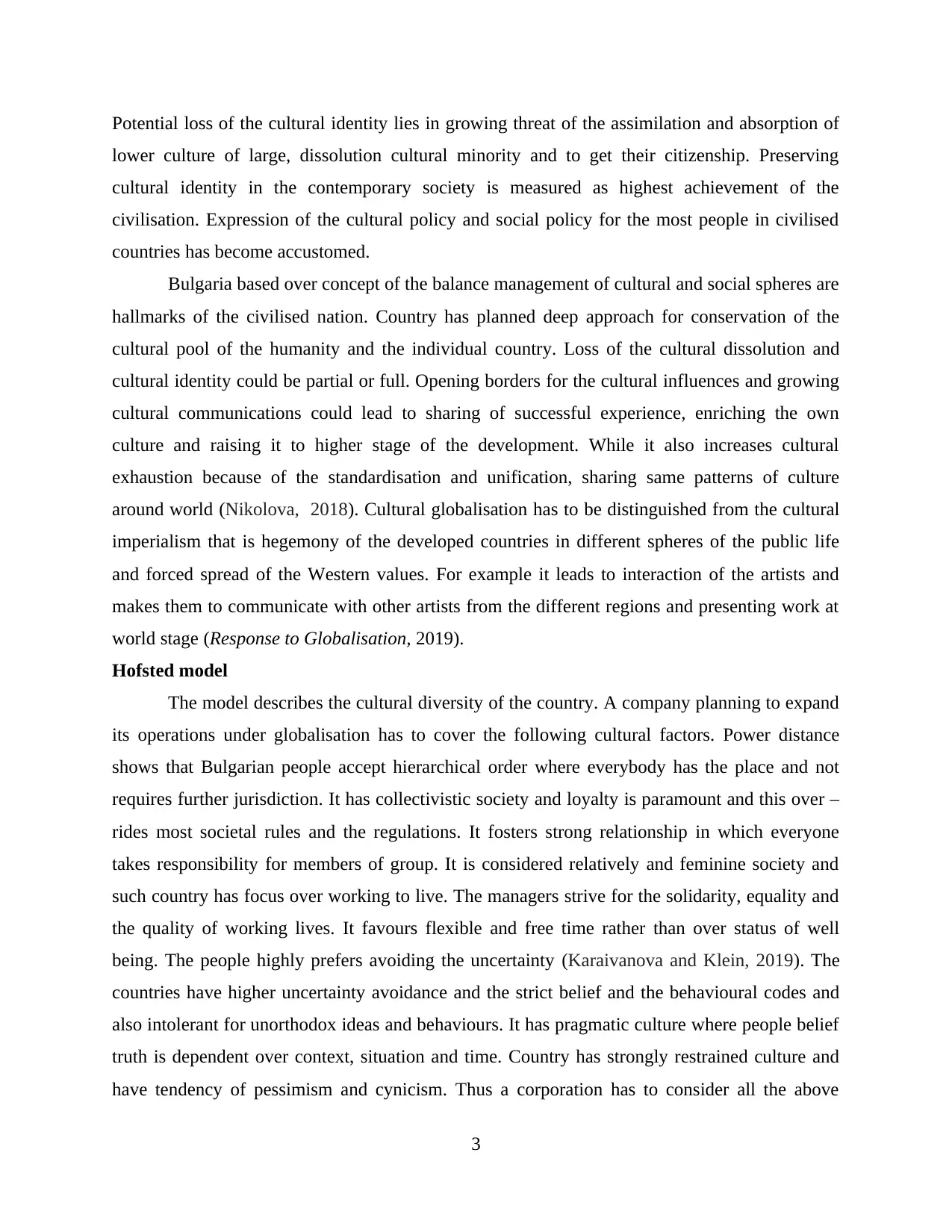
Potential loss of the cultural identity lies in growing threat of the assimilation and absorption of
lower culture of large, dissolution cultural minority and to get their citizenship. Preserving
cultural identity in the contemporary society is measured as highest achievement of the
civilisation. Expression of the cultural policy and social policy for the most people in civilised
countries has become accustomed.
Bulgaria based over concept of the balance management of cultural and social spheres are
hallmarks of the civilised nation. Country has planned deep approach for conservation of the
cultural pool of the humanity and the individual country. Loss of the cultural dissolution and
cultural identity could be partial or full. Opening borders for the cultural influences and growing
cultural communications could lead to sharing of successful experience, enriching the own
culture and raising it to higher stage of the development. While it also increases cultural
exhaustion because of the standardisation and unification, sharing same patterns of culture
around world (Nikolova, 2018). Cultural globalisation has to be distinguished from the cultural
imperialism that is hegemony of the developed countries in different spheres of the public life
and forced spread of the Western values. For example it leads to interaction of the artists and
makes them to communicate with other artists from the different regions and presenting work at
world stage (Response to Globalisation, 2019).
Hofsted model
The model describes the cultural diversity of the country. A company planning to expand
its operations under globalisation has to cover the following cultural factors. Power distance
shows that Bulgarian people accept hierarchical order where everybody has the place and not
requires further jurisdiction. It has collectivistic society and loyalty is paramount and this over –
rides most societal rules and the regulations. It fosters strong relationship in which everyone
takes responsibility for members of group. It is considered relatively and feminine society and
such country has focus over working to live. The managers strive for the solidarity, equality and
the quality of working lives. It favours flexible and free time rather than over status of well
being. The people highly prefers avoiding the uncertainty (Karaivanova and Klein, 2019). The
countries have higher uncertainty avoidance and the strict belief and the behavioural codes and
also intolerant for unorthodox ideas and behaviours. It has pragmatic culture where people belief
truth is dependent over context, situation and time. Country has strongly restrained culture and
have tendency of pessimism and cynicism. Thus a corporation has to consider all the above
3
lower culture of large, dissolution cultural minority and to get their citizenship. Preserving
cultural identity in the contemporary society is measured as highest achievement of the
civilisation. Expression of the cultural policy and social policy for the most people in civilised
countries has become accustomed.
Bulgaria based over concept of the balance management of cultural and social spheres are
hallmarks of the civilised nation. Country has planned deep approach for conservation of the
cultural pool of the humanity and the individual country. Loss of the cultural dissolution and
cultural identity could be partial or full. Opening borders for the cultural influences and growing
cultural communications could lead to sharing of successful experience, enriching the own
culture and raising it to higher stage of the development. While it also increases cultural
exhaustion because of the standardisation and unification, sharing same patterns of culture
around world (Nikolova, 2018). Cultural globalisation has to be distinguished from the cultural
imperialism that is hegemony of the developed countries in different spheres of the public life
and forced spread of the Western values. For example it leads to interaction of the artists and
makes them to communicate with other artists from the different regions and presenting work at
world stage (Response to Globalisation, 2019).
Hofsted model
The model describes the cultural diversity of the country. A company planning to expand
its operations under globalisation has to cover the following cultural factors. Power distance
shows that Bulgarian people accept hierarchical order where everybody has the place and not
requires further jurisdiction. It has collectivistic society and loyalty is paramount and this over –
rides most societal rules and the regulations. It fosters strong relationship in which everyone
takes responsibility for members of group. It is considered relatively and feminine society and
such country has focus over working to live. The managers strive for the solidarity, equality and
the quality of working lives. It favours flexible and free time rather than over status of well
being. The people highly prefers avoiding the uncertainty (Karaivanova and Klein, 2019). The
countries have higher uncertainty avoidance and the strict belief and the behavioural codes and
also intolerant for unorthodox ideas and behaviours. It has pragmatic culture where people belief
truth is dependent over context, situation and time. Country has strongly restrained culture and
have tendency of pessimism and cynicism. Thus a corporation has to consider all the above
3
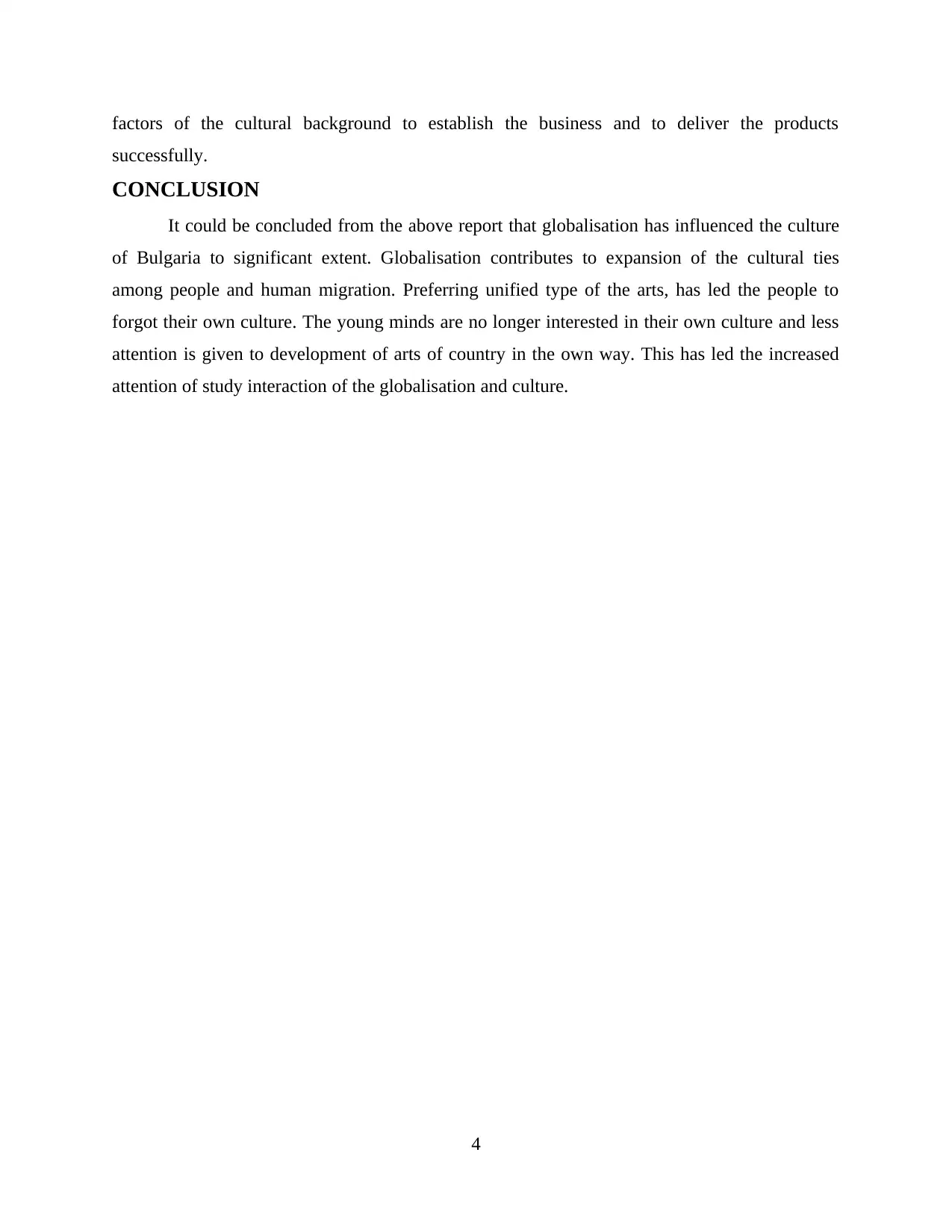
factors of the cultural background to establish the business and to deliver the products
successfully.
CONCLUSION
It could be concluded from the above report that globalisation has influenced the culture
of Bulgaria to significant extent. Globalisation contributes to expansion of the cultural ties
among people and human migration. Preferring unified type of the arts, has led the people to
forgot their own culture. The young minds are no longer interested in their own culture and less
attention is given to development of arts of country in the own way. This has led the increased
attention of study interaction of the globalisation and culture.
4
successfully.
CONCLUSION
It could be concluded from the above report that globalisation has influenced the culture
of Bulgaria to significant extent. Globalisation contributes to expansion of the cultural ties
among people and human migration. Preferring unified type of the arts, has led the people to
forgot their own culture. The young minds are no longer interested in their own culture and less
attention is given to development of arts of country in the own way. This has led the increased
attention of study interaction of the globalisation and culture.
4
⊘ This is a preview!⊘
Do you want full access?
Subscribe today to unlock all pages.

Trusted by 1+ million students worldwide
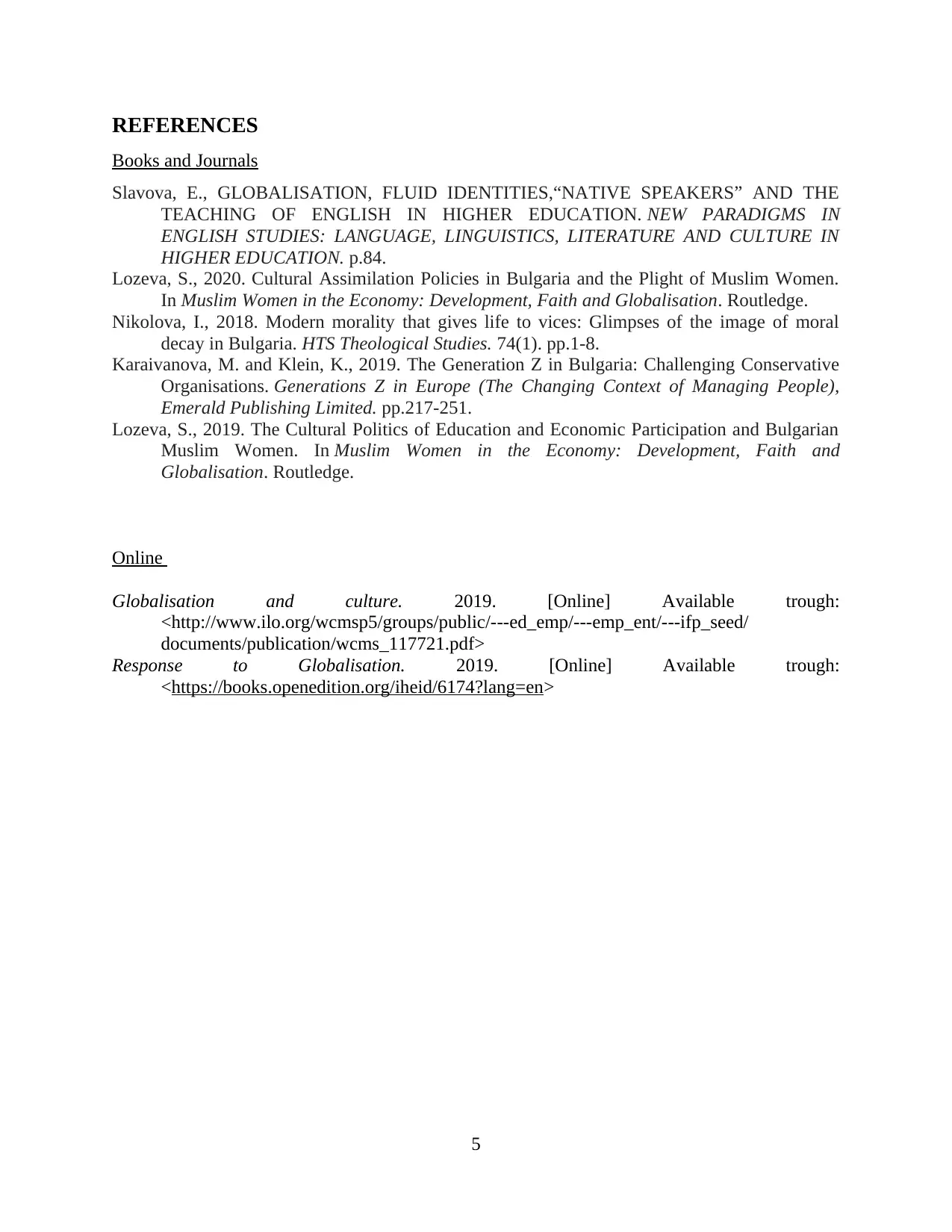
REFERENCES
Books and Journals
Slavova, E., GLOBALISATION, FLUID IDENTITIES,“NATIVE SPEAKERS” AND THE
TEACHING OF ENGLISH IN HIGHER EDUCATION. NEW PARADIGMS IN
ENGLISH STUDIES: LANGUAGE, LINGUISTICS, LITERATURE AND CULTURE IN
HIGHER EDUCATION. p.84.
Lozeva, S., 2020. Cultural Assimilation Policies in Bulgaria and the Plight of Muslim Women.
In Muslim Women in the Economy: Development, Faith and Globalisation. Routledge.
Nikolova, I., 2018. Modern morality that gives life to vices: Glimpses of the image of moral
decay in Bulgaria. HTS Theological Studies. 74(1). pp.1-8.
Karaivanova, M. and Klein, K., 2019. The Generation Z in Bulgaria: Challenging Conservative
Organisations. Generations Z in Europe (The Changing Context of Managing People),
Emerald Publishing Limited. pp.217-251.
Lozeva, S., 2019. The Cultural Politics of Education and Economic Participation and Bulgarian
Muslim Women. In Muslim Women in the Economy: Development, Faith and
Globalisation. Routledge.
Online
Globalisation and culture. 2019. [Online] Available trough:
<http://www.ilo.org/wcmsp5/groups/public/---ed_emp/---emp_ent/---ifp_seed/
documents/publication/wcms_117721.pdf>
Response to Globalisation. 2019. [Online] Available trough:
<https://books.openedition.org/iheid/6174?lang=en>
5
Books and Journals
Slavova, E., GLOBALISATION, FLUID IDENTITIES,“NATIVE SPEAKERS” AND THE
TEACHING OF ENGLISH IN HIGHER EDUCATION. NEW PARADIGMS IN
ENGLISH STUDIES: LANGUAGE, LINGUISTICS, LITERATURE AND CULTURE IN
HIGHER EDUCATION. p.84.
Lozeva, S., 2020. Cultural Assimilation Policies in Bulgaria and the Plight of Muslim Women.
In Muslim Women in the Economy: Development, Faith and Globalisation. Routledge.
Nikolova, I., 2018. Modern morality that gives life to vices: Glimpses of the image of moral
decay in Bulgaria. HTS Theological Studies. 74(1). pp.1-8.
Karaivanova, M. and Klein, K., 2019. The Generation Z in Bulgaria: Challenging Conservative
Organisations. Generations Z in Europe (The Changing Context of Managing People),
Emerald Publishing Limited. pp.217-251.
Lozeva, S., 2019. The Cultural Politics of Education and Economic Participation and Bulgarian
Muslim Women. In Muslim Women in the Economy: Development, Faith and
Globalisation. Routledge.
Online
Globalisation and culture. 2019. [Online] Available trough:
<http://www.ilo.org/wcmsp5/groups/public/---ed_emp/---emp_ent/---ifp_seed/
documents/publication/wcms_117721.pdf>
Response to Globalisation. 2019. [Online] Available trough:
<https://books.openedition.org/iheid/6174?lang=en>
5
1 out of 7
Your All-in-One AI-Powered Toolkit for Academic Success.
+13062052269
info@desklib.com
Available 24*7 on WhatsApp / Email
![[object Object]](/_next/static/media/star-bottom.7253800d.svg)
Unlock your academic potential
Copyright © 2020–2025 A2Z Services. All Rights Reserved. Developed and managed by ZUCOL.